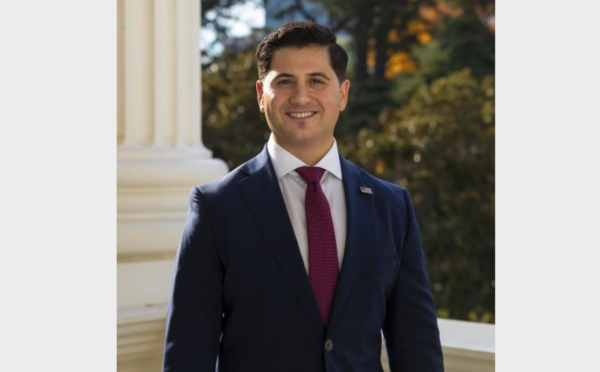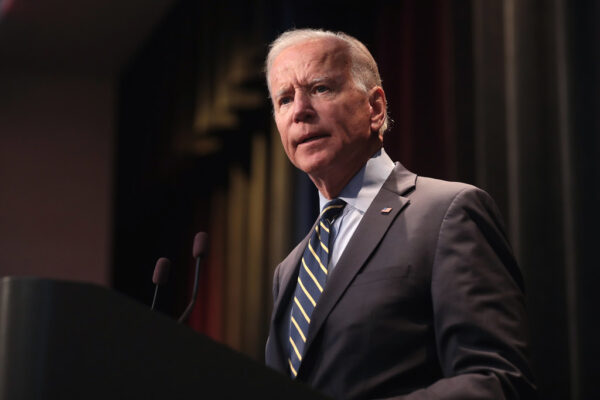Assemblyman Bill Essayli, R-Norco, introduced legislation Monday to assert the freedom of teachers to openly communicate with parents regarding their children’s gender transition decisions, based on a Jurupa Valley educator’s firing over her predisposition toward full disclosure.
“Public policy should never presume that a parent does not have the best interest for that child,” Essayli said during a briefing outside Jurupa Valley High School Monday. “Concealing information from parents is not only wrong; it’s dangerous and harmful to the safety of trans minors. Parents play a critical role in nurturing and supporting children, and they cannot be removed from the equation.”
Essayli’s proposed legislation, Assembly Bill 1314, would reinforce in the California Education Code provisions already in place establishing a “parent’s right to know,” he said.
“This law would reset the appropriate relationship between children and their parents,” the assemblyman said. “Children are the domain of their parents, not the government.”
Essayli was inspired to author the bill after learning about the treatment of physical education teacher Jessica Tapia, who was terminated from Jurupa High earlier this year following her challenge to a Jurupa Unified School District policy that limited her ability to convey messages to parents regarding their children’s gender identity preferences.
Tapia ran afoul a district policy linked to AB 1266, which was signed into law in 2014. The bill focused on “pupil rights,” expanding on Section 221.5 of the education code regarding students’ participation in courses.
The thrust of AB 1266 was that a “pupil shall be permitted to participate in sex-segregated school programs and activities, including athletic competitions, and use facilities consistent with his or her gender identity, irrespective of the gender listed on the pupil’s records.”
There were no explicit provisions written into the bill prohibiting educators from talking with parents about their kids’ gender choices. However, legal guidelines attached in a companion measure cited the California Public Records Act, Article 1, Section 1 of the state constitution and the federal Family Educational & Privacy Rights Act — FERPA — in establishing limits on what educators are permitted to disclose.
“Parents want to know everything happening with their child,” Tapia said during the briefing. “They are trusting us to make sure their child is safe and taken care of.”
She said her termination was rooted in an interaction with administrators during which she and colleagues were instructed “to withhold information from parents” whenever they encountered a student who had begun identifying as a different gender.
“Right away, a major red flag popped up,” Tapia said. “I said, ‘Are you asking me to lie?’ And they said, ‘Yes, it’s for students’ privacy.’ It was just so bizarre to me, because you’re talking about minors. The decision-making portal of their brain is not fully developed. They need their parents at this time for everything they’re going through. I can’t understand why the school system thinks that we ought to act as though we are the parents.”
Tapia alleges that JUSD administrators found her Christian religious principles, which she said guided her in all life decisions, conflicted with the district’s policy regarding nondisclosure, and she lost her job because of it. She has initiated civil action against the district based on religious viewpoint discrimination, specifically protected under Title 7 of the 1964 Civil Rights Act, according to her attorney, Pacific Justice Institute President Brad Dacus.
JUSD released a statement last week, saying, “The district denies the allegations raised by Ms. Tapia. The district takes seriously its obligation to accommodate its employee’s religious beliefs. Simultaneously, the district is obligated to comply with all local, state and federal laws, including anti-discrimination laws and laws that protect students’ rights to privacy, which are in place to protect the nearly 2,500 employees and 18,000 students we serve.”
“She was fired because of her beliefs and conscience,” Dacus said. “She’s not alone. There are people across the country who are being fired because of their beliefs, not because of their job performance. It’s outrageous. Parents trust public schools when they drop their kids off.”
He said Essayli’s bill “validates what parents already are assuming exists, which is recognition of their fundamental rights over their children. Now is the time to send a message to school districts like this that we’re not going to take this.”







